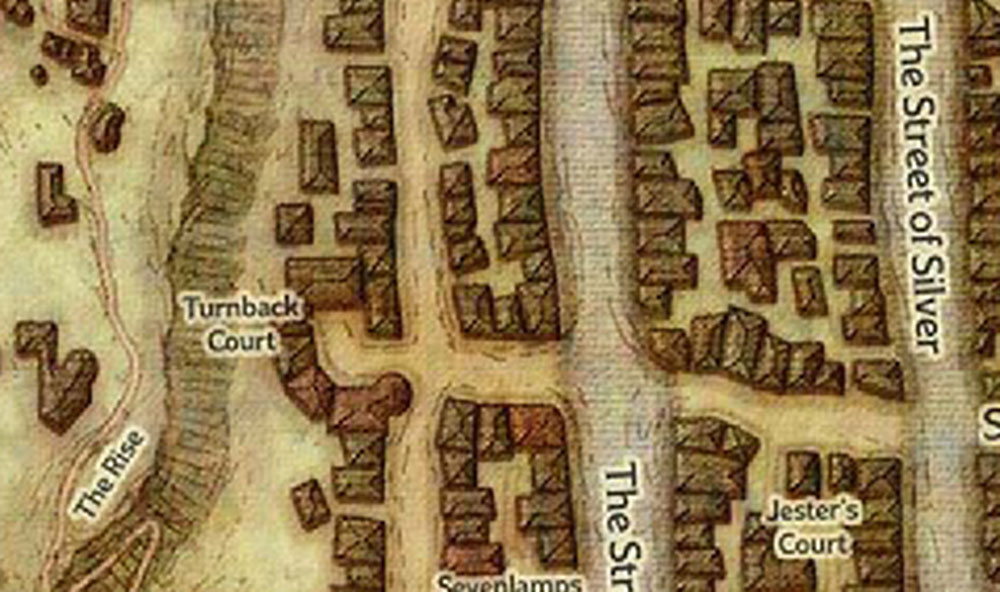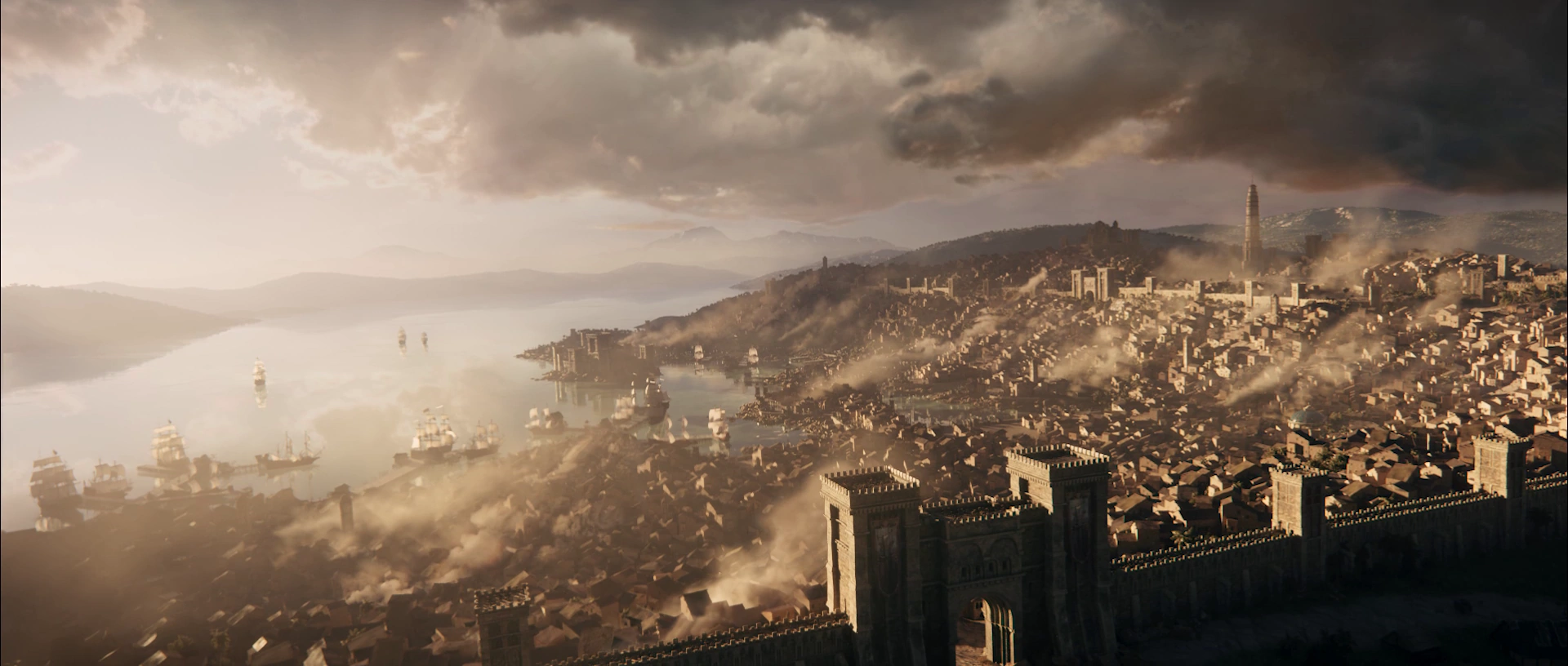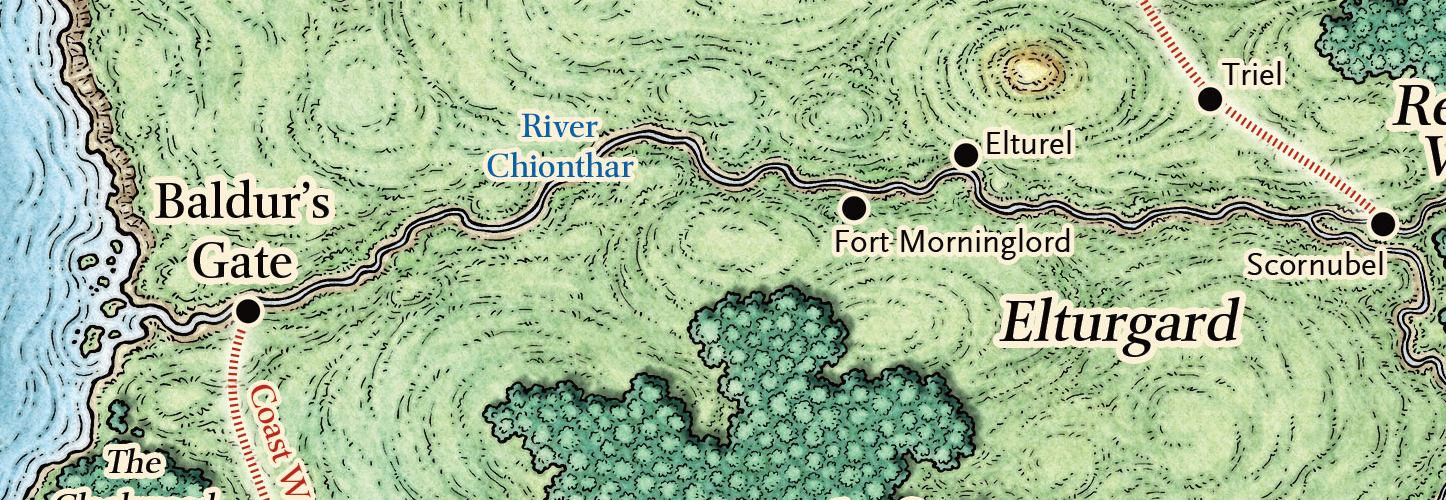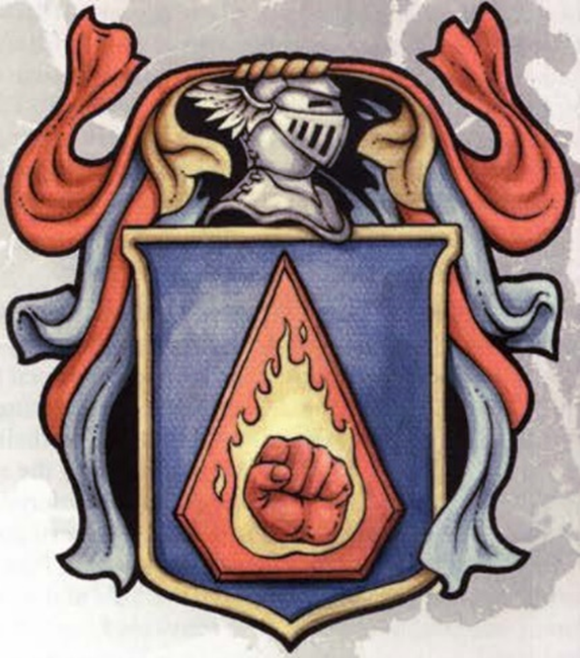Since we were just discussing Tarina in the Elfsong Tavern, let’s take a moment to talk about the tavern itself.
The tavern is described with:
- A list of tavern patrons
- A map
- A detailed key for all the rooms (upstairs and downstairs)
- The lyrics of an elfsong sung by the local ghost in tribute to lost Elturel
(The tavern has apparently lost the stuffed baby beholder that used to hang over the bar in the 14th century.)
Structurally, however, this is what happens at the tavern:
- The PCs talk to Tarina, who refuses to give them the information until they help her kill some pirates who are coming to attack her.
- They wait for the pirates to show up.
- The pirates show up. They fight.
- Tarina gives them the information.
- They leave.
The first problem here is that the structure doesn’t make it easy for the GM to leverage all the material presented about the tavern. The most egregious example of this is the sahuagin priestess Oshalla: Three hundred words are dedicated to describing this NPC who the PCs don’t know about, no one mentions, and who is behind a locked door on the second floor of the tavern. (Remember: The PCs have no reason to ever leave the common room of the tavern.)
She seems sort of interesting, but what the hell is she doing here?
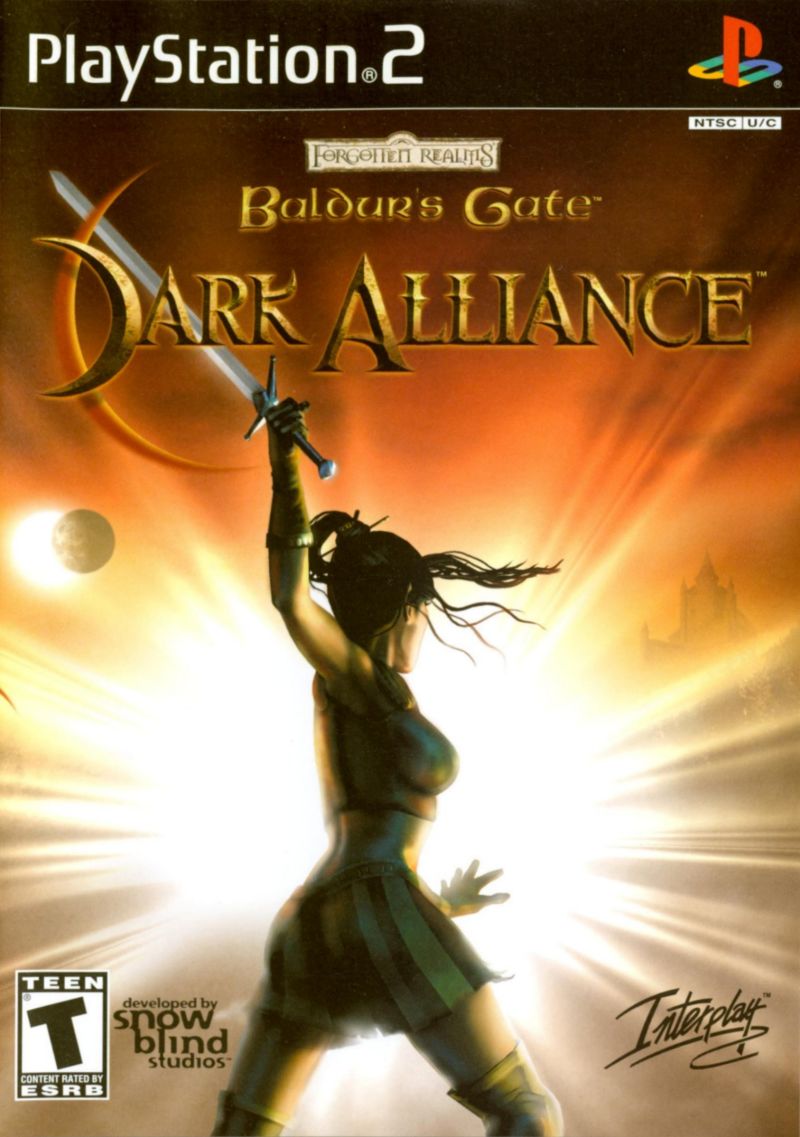 Part of the explanation here is that the Elfsong Tavern appeared in the Baldur’s Gate and Baldur’s Gate: Dark Alliance computer roleplaying games. Its inclusion is a nostalgic love letter that will resonate with a lot of players, so it gets an uber-detailed description. On the other hand, this ultimately just emphasizes the problem: If we care enough about the Elfsong Tavern to describe it in encyclopedic detail, why not structure the scenario so that the players at the table can experience that content?
Part of the explanation here is that the Elfsong Tavern appeared in the Baldur’s Gate and Baldur’s Gate: Dark Alliance computer roleplaying games. Its inclusion is a nostalgic love letter that will resonate with a lot of players, so it gets an uber-detailed description. On the other hand, this ultimately just emphasizes the problem: If we care enough about the Elfsong Tavern to describe it in encyclopedic detail, why not structure the scenario so that the players at the table can experience that content?
The second problem is that the scenario structure here is very weak. Tarina basically says, “I will help you after the next cut scene.” But then the GM is supposed to make the PCs wait an arbitrary and unspecified amount of time before triggering the cut scene in a location where there’s basically nothing for them to do except say, “We wait.”
(The more cynical take is that the writers are expecting the PCs to act as if they’re in a CRPG and go around picking the locks on every private door in the joint.)
ENTER TARINA
Tarina is the reason that the PCs are there, so she’s going to be the lynchpin of whatever structure we apply here. The biggest problem we have here is the entire “I’ve heard a rumor some pirates might show up and try to kill me tonight” interaction: It’s overly complicated and it doesn’t really make a lot of sense.
The book says that the intention here is to give the PCs time to explore the tavern while they wait. But if they’re supposed to by bodyguarding Tarina, they’re probably not going to wander away, right?
We’re going to make a simple tweak here:
- When the PCs show up at he Elfsong Tavern, Tarina isn’t here.
- She shows up.
- She tells the PCs the information they need.
And that’s it. We don’t need any frills to get the job done here.
ELFSONG
The Elfsong Tavern is haunted by the spirit of an elven woman who periodically sings a ghostly lament for a lover lost at sea. According to Volo’s Guide to the Sword Coast, “the voice is never heard more than twice in an evening, but usually at least every three nights, and never during the sunlit hours.” The song is always the same.
Descent Into Avernus, therefore, has a really interesting moment in which the spirit unexpectedly begins singing a lay to fallen Elturel. This includes a full set of beautiful, poetic lyrics which I suspect some might be suspicious of, but which I think can actually create a great moment at the gaming table.
Unfortunately, the moment won’t actually work because the adventure doesn’t put in the necessary work to make it land. “This surprises everyone,” the book says… except the PCs. Because the PCs have never heard the spirit sing before, don’t know that it never changes its tune, and don’t know that this isn’t the regular tune.
RULE OF THREE: The Rule of Three is a narrative principle in which you (1) establish something, (2) reinforce it, and then (3) pay it off. (And the pay off can also be a reversal of the expectation you’ve established.)
We’ll do the same thing here:
- The Elfsong is being sung when the PCs come through the door. They walk into the “customary hush that falls over the tavern while the ghostly voice sings her sad lament” (Volo’s Guide to the Sword Coast).
- The spirit begins singing again when Tarina arrives. (Some or all of the PCs are likely to be upstairs when you trigger this moment. Note that the song can be heard everywhere in the building.)
- As they’re finishing their conversation with Tarina (just after she’s given them the information), the spirit sings the lay to fallen Elturel.
Basically, you show the players what’s usual so that you don’t have to tell them when it’s unusual. The moment is allowed to speak for itself. (You can still reinforce this, of course, by describing the haunted reaction of the tavern regulars.)
THE REGULARS: It’s fairly plausible that the first or second instance of the song will prompt the PCs to ask someone what the song is all about. Try to color this with that NPC’s personal opinion and relationship with the song. For example, Alan Alyth, the owner of the tavern, might tell about how his grandmother, Lady Alyth Eldendara, heard the song just once and bought the tavern that very night. The former owner agreed only on the condition that he would always have a seat in the tavern where he could come each night to listen to the song. Theomon’s Chair still sits in the corner, sacrosanct and unused by any patron.
(No, I don’t know why Alan’s last name is his grandmother’s first name.)
This allows the Elfsong to become a potential icebreaker or easy topic of conversation as the PCs interact with the NPCs here.
THE FIRST TIMER: You might also add an extra touch to the first or second instance of the song by describing it’s effect on another first timer. Also from Volo’s Guide to the Sword Coast: “A first-timer … who breaks down into tears upon hearing the song is usually embraced and comforted by the nearest regular patron.”
(This is superior to trying to tell the players that their characters “feel really sad” about hearing the song. Telling players what their characters are feeling is generally a bad idea.)
OSHALLA
While the PCs are waiting for Tarina to show up, Alan Alyth comes over to their table. He’s seen the Flaming Fist badges they’re wearing and he’d like their help. He has a tenant renting a room upstairs who has fallen behind on her rent. She’s locked her door and refuses to come out.
The tenant in question is Oshalla, the sahuagin priestess I mentioned above.
(This leverages Oshalla so that the PCs will actually interact with her. It also reinforces their new role as members of the Flaming Fist.)
TOPICS OF CONVERSATION
FALL OF ELTUREL: Use the Rumors of Elturel addendum to seed the conversation here. This will continue building up the enigma around Elturel’s disappearance. (As does the lay sung by the elf spirit later, of course.) As in Part 1, make a point of including High Observer Thavius Kreeg (and the fact he’s presumed to be lost with the rest of the city).
FLAMING FIST LEADERSHIP: With Grand Duke Ravengard missing and presumed dead in the Fall of Elturel, there’s a lot of speculation about who will become the new Marhsal of the Flaming Fist.
- Blaze Beldroth over in the western Lower City has reportedly promoted himself to Marshal and is issuing orders. It’s unclear how many Flames are actually following those orders.
- Duke Portyr has recalled his niece, Liara Portyr, from Fort Beluarian in Chult. It’s assumed he’s planning to push her into the leadership position.
- Blaze Mukar, commander of Wyrm’s Rock, is also in a powerful position.
- This is all just a test by Grand Duke Ravengard to see who’s loyal and who’s not.
- The Eltan family, heirs of the Eltan who originally founded the Flaming Fists but sold off their shares in order pay off debts, is preparing to buy back in, with Taraphael Eltan becoming the new Marshal.
- Yvandre Rillyn, a Flaming Fist veteran, has been running the Rillyn School for Swordplay. The school is actually the front for a conspiracy to seize control of the Flaming Fist. Rumor has it that Rillyn “students” were seen in Elturel before its fall. (See Descent Into Avernus, p. 182.)
THE NEXT GRAND DUKE: Ravengard’s death also opens up the position of Grand Duke. Use this gossip to establish all of the surviving dukes (see Descent, p. 162):
- Duke Belynne Stelmane
- Duke Dillard Portyr
- Duke Thalamra Vanthampur
As for the filling the fourth ducal position, any number of patriar families might be mentioned (including Taraphael Eltan). See p. 165 of Descent Into Avernus.
REFUGEES: There are those who think Baldur’s Gate should be doing more to help. There also those spewing out all kinds of anti-refugee rhetoric and conspiracy theories (like the rumor on p. 18, “I’ll bet my last copper piece that those so-called refugees are advance scouts for an army that’s preparing to attack Baldur’s Gate!”).
REDUX REFUGEE
Grab one of the refugees from the refugee caravan (or a small group/family) and have them come into the Elfsong Tavern. They’re trying to find lodging, but everywhere they’ve checked is sold out. (So is the Elfsong Tavern… unless the PCs have created a vacancy upstairs.)
That refugee who was pregnant and now has a newborn baby is probably a great choice for pathos here.
That guy who was spewing vile anti-refugee conspiracy theories a couple minutes ago? It’s a great time for him to open his stupid mouth again.
THE PIRATES
I’ll be honest: I think the pirate encounter is kind of dumb. I think the setup with Tarina knowing they’re looking for her is awkward at best and the whole thing ultimately contributes nothing to the scenario and means nothing. I suspect it’s largely here because the writers needed to level the PCs up and felt it was even more ridiculous to do without at least some kind of fight.
(If, as I’ve suggested, you’ve either run the refugee caravan scenario or simply had the players create 2nd level characters, then this is completely unnecessary.)
THE SURPRISE: If you still want to include the pirates, then just have them burst through the doors as Tarina finishes briefing the PCs. “Oh crap, these guys again,” she says, and asks the PCs to help her deal with them.
THE RUNNING GAG: If you’ve replaced Tarina with a PC, the pirates could be worked in as a running gag as long as they’re in Baldur’s Gate. Everywhere they go… more bloody pirates seeking revenge.
THE TAVERN BRAWL: Alternatively, just start a brawl in the tavern. If the PCs do something stupid, great. Otherwise, have a quarrel over the refugees escalate until somebody breaks a bottle.
EVENT SEQUENCE
A quick summary/checklist of everything we’ve just talked about:
- Entering the Elfsong Tavern while the Elfsong is being sung.
- Tarina isn’t there yet.
- Alyth comes over to ask them to deal with the deadbeat Oshalla.
- Refugee enters, desperate for lodging.
- Tarina arrives. Elfsong again.
- Tarina briefs the PCs.
- Elfsong: The Lay of Elturel.
- Optional: Pirate Booty Kickin’ / Tavern Brawl
This should give you enough narrative space to frame conversations around the PCs (implicitly inviting them to join in), have NPCs approach them for a friendly chat, and/or let the players take the initiative and find someone to talk to.
ALTERNATIVE CAMPAIGN HOOKS
Well, we did establish that these killings were targeting refugees, right? Pick one of the refugees from the caravan (preferably whichever one was the players’ favorite) and murder them. Other refugees from the caravan find the PCs and ask for their help again. (The refugees might have found lodging at the Elfsong Tavern, so you can still frame this scene there.) You can then use Part 3D: Investigating the Murders to bring the PCs into the Vanthampur Investigations.
(Alternatively, if you prefer to follow more closely the structure of the original book, you can use an investigative montage to point the PCs at the bathhouse the Dead Three cultists are using.)

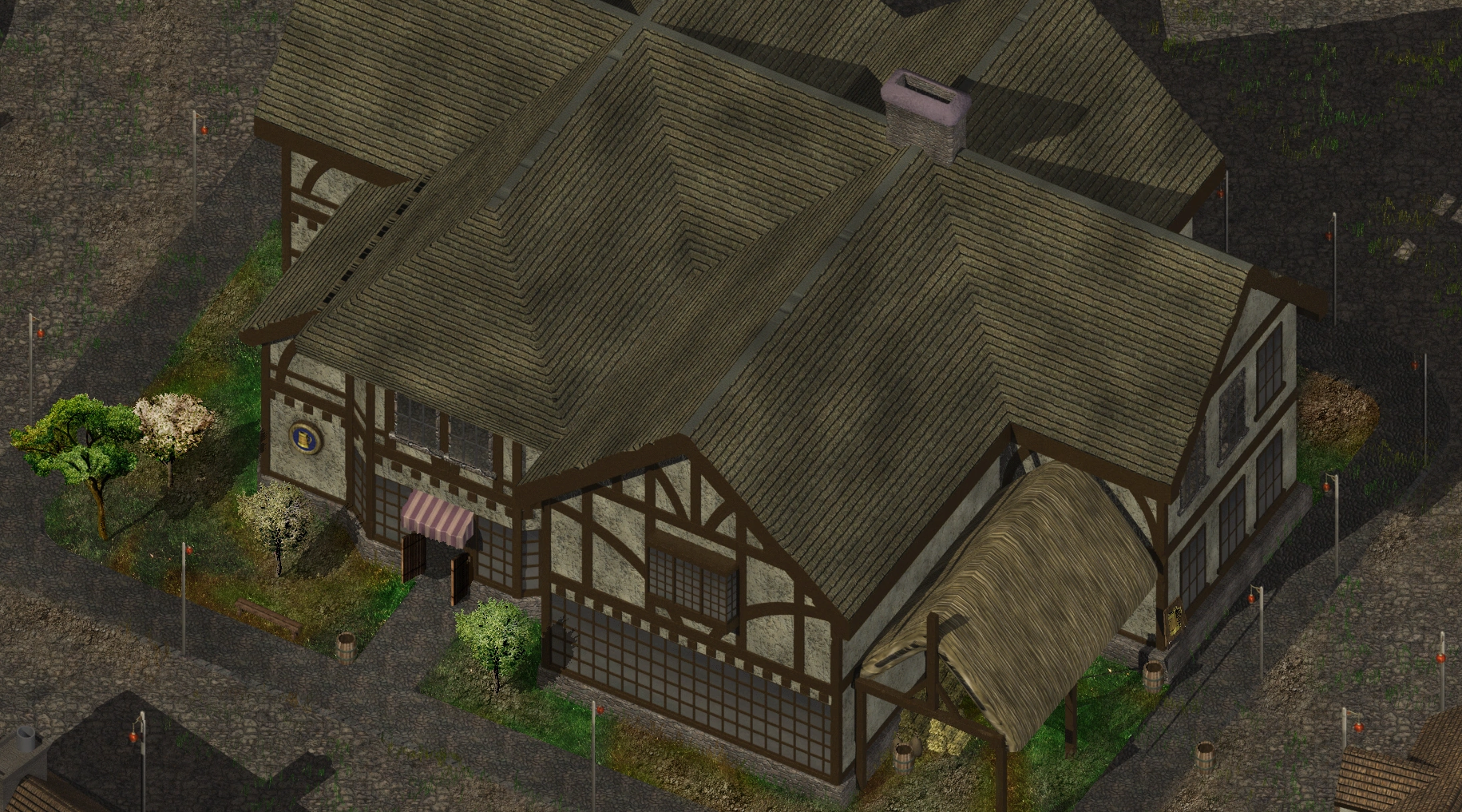
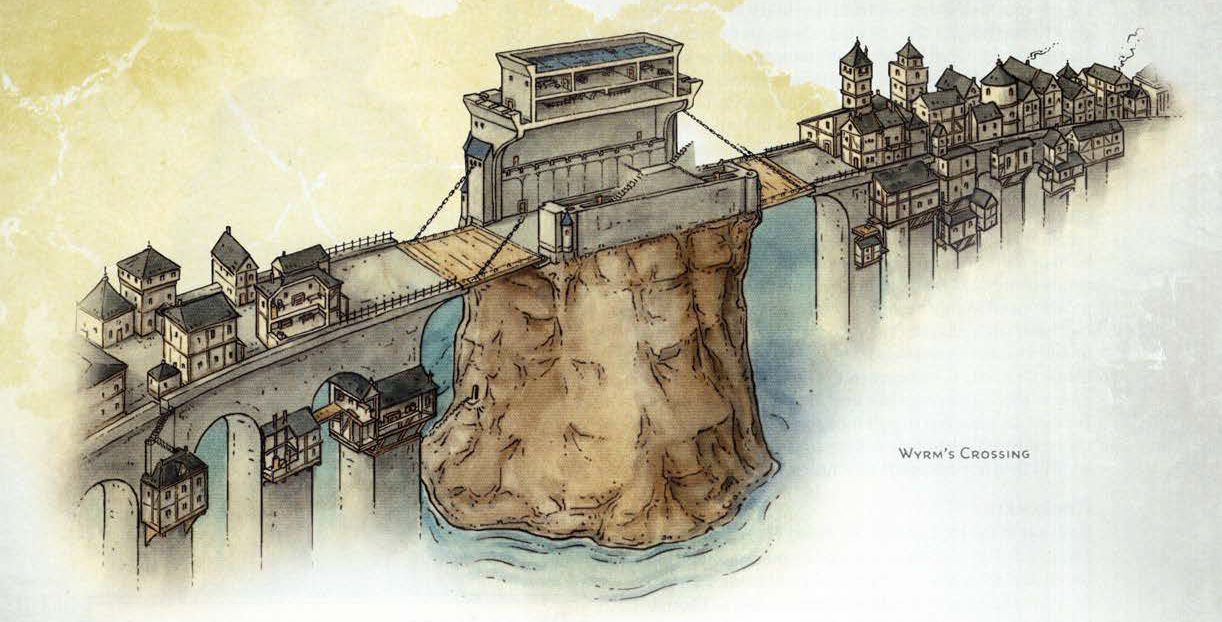
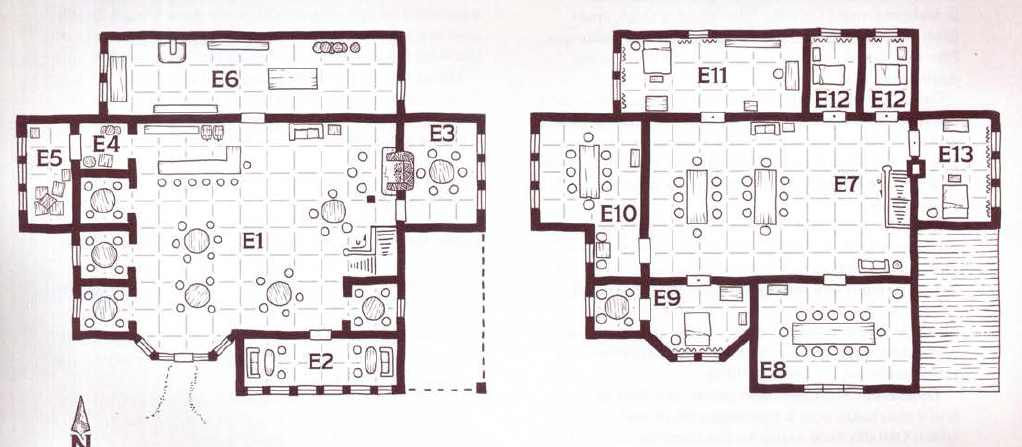
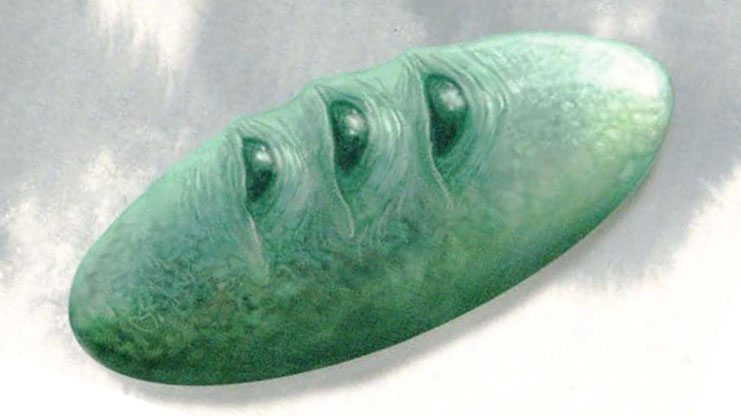
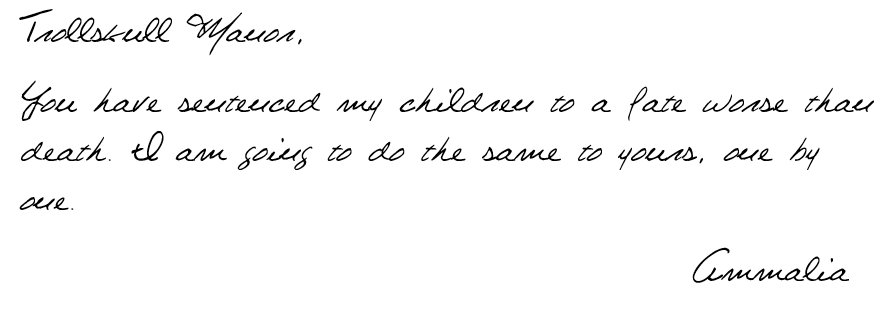
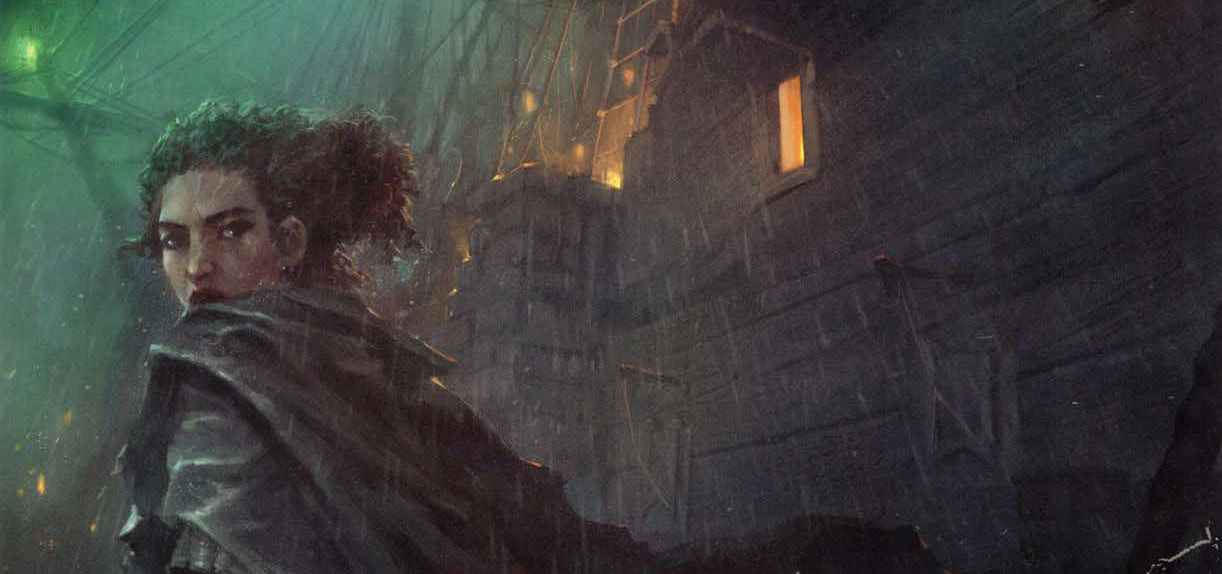
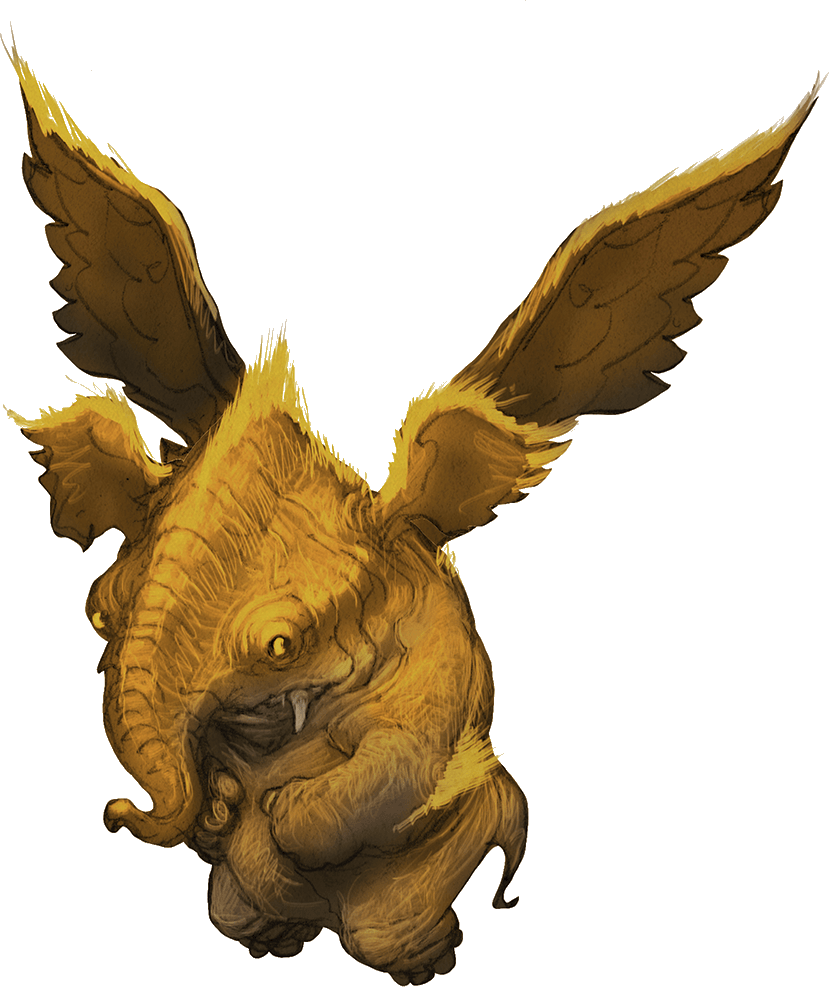
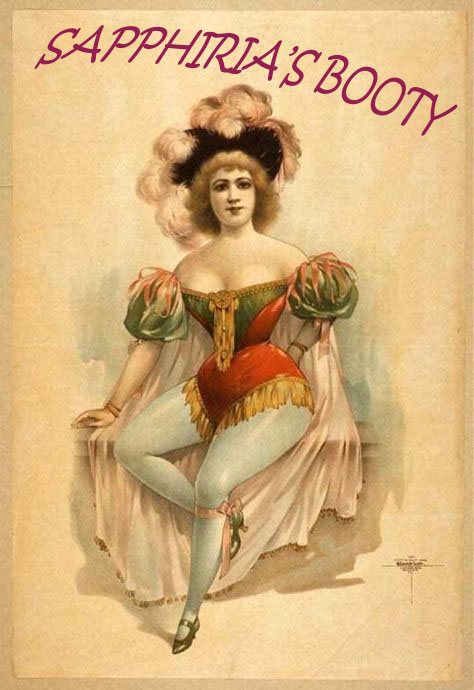 Arriving at the theater, they found it under guard. Suspicious looking thugs were watching the front door from across the street, and a couple more were loitering around the side entrance. The thugs looked human, but… They shrugged and headed down the alley, passing by posters still advertising performances of Sapphiria’s Booty and identifying themselves to the thugs. “We’re here to meet with Rongquan. Is he in?”
Arriving at the theater, they found it under guard. Suspicious looking thugs were watching the front door from across the street, and a couple more were loitering around the side entrance. The thugs looked human, but… They shrugged and headed down the alley, passing by posters still advertising performances of Sapphiria’s Booty and identifying themselves to the thugs. “We’re here to meet with Rongquan. Is he in?”